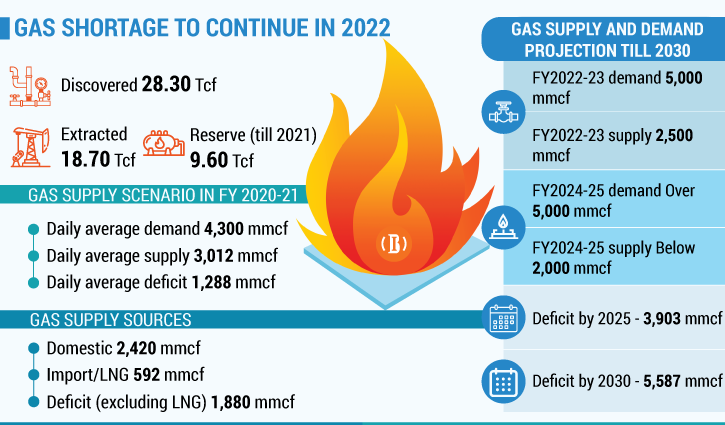Gas crisis to hit industries in 2022
Hasan Azad || BusinessInsider

Photo illustration: Business Insider Bangladesh
Bangladesh is going to face a severe gas shortage in 2022 due to the slow pace of gas exploration and increasing dependency on imports.
In FY 202-21, Bangladesh on average had a demand for 4,300 mmcfd (million cubic feet per day) of the methane gas against a supply of 3,012 mmcfd—a deficit of 1,288 mmcfd, according to Petrobangla.
In that year, domestically explored gas stood at 2,420 mmcfd while the rest of the supply came from imports worth 592 mmcfd in the form of re-gasified liquefied natural gas (RLNG).
Petrobangla documents show the gap will widen in the years to come.
According to the Master Plan-2017, the deficit will be 3,903 mmcfd in 2025 and 5,587 mmcfd in 2030.
In the next fiscal, gas demand will reach nearly 5,000 mmcfd. If no new gas is added to the national grid during this period, supply would crunch to 2,500 mmcfd.
Against this backdrop, if the current state of the gas situation in Bangladesh is allowed to persist, industrial production in the country would be badly disrupted, experts warned.
To avoid this situation, they suggested enhancing oil and gas exploration operations in the country through domestic and foreign companies, and also hiring experienced people in local companies.
Although the authorities concerned have acknowledged the looming crisis, no initiative has been taken so far.
Petrobangla has been applying a short-term solution to resolve the crisis by importing LNG (liquified natural gas).
Still, the crisis has not been resolved due to high LNG prices in the international market and technical glitches at LNG terminals, leaving Bangladesh with the only option to ration gas supplies.
“As long as Bangladesh remains dependent on imports, the gas crisis will keep haunting us,” Md Maqbul-E-Elahi Chowdhury, member (Gas), Bangladesh Energy Regulatory Commission (BERC), told the Business Insider Bangladesh.
“Bapex can’t be the sole institution to conduct gas exploration operations in Bangladesh,” the energy expert said adding that the state-owned exploration company lacks skilled manpower.
The government must involve foreign companies in this effort, he insisted.
Confirming the technical faults at LNG terminals, Petrobangla Director Ali Mohammad Al Mamun said gas supply disruptions will remain until February 8 due to the terminal issue.
Also acknowledging the gas crisis in Bangladesh, he said, “We have not discussed the matter yet. However, a meeting will be held soon to monitor and resolve the situation. A decision will be taken later in consultation with the ministries concerned.”
According to the BERC Annual Report 2020-21, about 46 per cent of the country’s energy comes from gas. Bangladesh has 28.30 Tcf (trillion cubic feet) minable gas reserves and about 18 Tcf gas has been extracted so far.
Bangladesh in 2021 extracted 0.89 Tcf gas and had only 9.60 Tcf of gas reserves at the end of the year.
An analysis of data on gas reserves, demand, production and supply from FY 2020-21 to FY 2040-41 shows the country’s reserves will gradually decline to a minimum level by 2030 unless new gas fields are discovered.
Noting that there is no new good news in the gas sector in the new year, energy expert Prof Ijaz Hossain told the Business Insider Bangladesh that the biggest mistake for the country in this sector was to get dependent on imports.
“We lag far behind while exploring our own gas and extracting it. We have a massive lack of skilled human resources in this sector,” he said.
Criticizing government steps to solve the crisis through LNG, Prof Hossain said, “Now we’re getting the result of over-dependence on imports. Because of the pandemic, now LNG has to be purchased from the international market at a higher price. If this continues, gas and electricity prices will have to be increased soon.”
He stressed having expanded gas storage capacity in Bangladesh to solve the crisis, saying the current crisis has now escalated due to faults in LNG terminals.
“However, if we had enough gas stored, gas could’ve been supplied uninterrupted even during unforeseen crisis periods such as this,” he added.
Professor Shamsul Alam, energy advisor to the Consumers Association of Bangladesh (CAB) said, “At the moment, it seems like we have good economic growth with enough electricity. But we are increasingly losing purchasing power which will be more evident in the new year.”
“There are indications that the energy sector has been intentionally turned into an import-depended one,” Prof Alam observed.
“For example,” he pointed out, “Gas from Bhola’s Shahbazpur Gas Field is not being supplied to the mainland, many ideas are stuck in the planning process, and exploration has been relaxed.”
These artificial and ill-intentioned crises could be attributed to an increase in the price of gas and electricity which benefits some, he claimed.
























